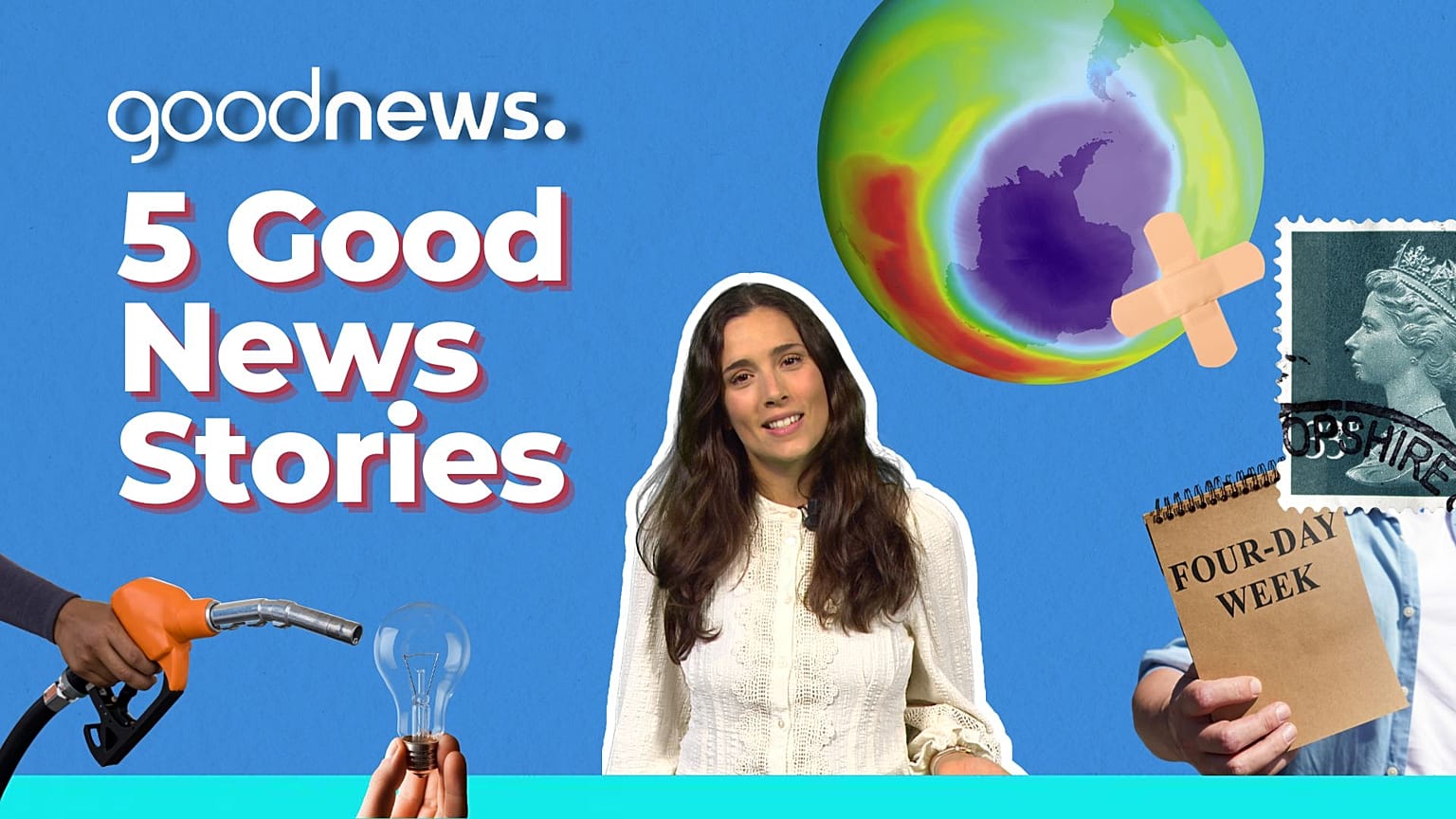Scientists have been excelling at their job lately: we’re getting better at battling cancer and we’ve helped the ozone layer hit a significant recovery milestone. Plus the four-day working week might soon go mainstream.
This week’s positive headlines bring good news about the ozone layer, which has made substantial recovery in what is being hailed as a ‘significant milestone’; there is – quite literally – light at the end of the tunnel for the energy crises in Europe with an underwater cable that will stretch over 1,000km to bring 'green energy' from Egypt; good news from the huge four-day working week trial that started in the UK earlier this year; more people are surviving cancer than ever before, and the fishing of sea turtles has sharply dropped in the last decade.
Click the video above to get the full digest and find out more on the following:
1. The ozone layer is recovering
It was back in the 1980s that scientists first discovered that man-made chemicals were damaging the ozone layer with disastrous effects. We were then warned that a vast hole was opening up over Antarctica every year, from August to December, thanks to complex meteorological and chemical processes.
Seven years later, the Montreal Protocol was signed to try and curb the number of harmful chemicals in the atmosphere.
A few decades have passed, and new research from the National Oceanic and Atmospheric Administration (NOAA) in the US has found that concentrations of harmful chemicals that damage the ozone layer have dropped. Concentrations of these chemicals over Antarctica are also dropping – at a slower rate – but still dropping.
Scientists at the NOAA say it is a “significant milestone” on the path to recovery. And they think the hole in the Antarctic ozone layer could eventually recover sometime around 2070.
My colleague Rosie Frost has the whole story. Read it here.
2. An underwater cable will bring 'green energy' from Egypt to Europe's electricity grid
A 1,373km underwater cable will bring 'green energy' from Egypt to Europe's electricity grid, running under the sea and using Greece as a gateway.
The cable will carry 3,000MW of electricity, enough to power up to 450,000 households.
This is excellent news, because – as you have surely noticed on your bills if you live in Europe – the continent is facing an unprecedented energy crisis. Russia has cut off supplies of cheap natural gas – supplies on which the continent has relied for years – as payback after the bloc imposed severe sanctions following the invasion of Ukraine.
Russia was the largest supplier of oil and gas to Europe in 2021, providing around 40 per cent of its total energy needs, to power factories, generate electricity and heat homes.
The GREGY interconnection cable will carry electricity produced in Egypt and other African countries using windfarms and solar parks.
Ioannis Karydas, CEO of the Copelouzos Group, the venture running the project, said to Euronews that "approximately one third [of the energy] will be consumed in Greece, and mainly in Greek industries, another third will be exported to neighbouring European countries and the remaining [energy] will be used for the production of green hydrogen."
3. Good news from a huge four-day working week trial
The biggest ever four-day week trial began in the UK in June this year.
The trial is being run by a not-for-profit group, in partnership with researchers from Cambridge University, Oxford University and Boston College who are studying the impact of reduced hours on productivity and worker well-being, as well as the impact on the environment.
The follow-up of that story is that the trial has been supported by 86 per cent of the companies who tried it, while keeping pay at the same levels. In a survey, they say they were likely to maintain the shorter working week once the six-month experiment had come to its end.
Forty-six per cent of businesses surveyed said productivity had been maintained at “around the same level”; 34 per cent reported a “slight” improvement and 15 per cent a “significant” improvement.
Joe O’Connor, the chief executive of 4 Day Week Global, the initiative running the trial, said the experiment could change the future of work and see the four-day week put into practice across every size of business and nearly every sector.
4. More people are surviving cancer than ever before
There are more cancer survivors in the US than ever before. That’s according to the American Association for Cancer Research.
The group's annual Cancer Progress Report has found death rates from cancer have been falling for the past two decades, and particularly sharply in recent years.
There are now more than 18 million cancer survivors in the US – up from three million in 1971.
Across every country in Europe, too, there’s been a continuous increase in five-year survival rates for the most common cancer types.
This is driven by a number of factors, including effective prevention and screening programmes, as well as advances in diagnostics, surgical techniques and new treatments.
Authorities say the growing use of techniques such as immunotherapies, which basically leverage the power of the immune system to fight cancer, has made a big difference.
5. New data bears good news for sea turtles.
A new analysis suggests illegal sea-turtle fishing has fallen sharply since the year 2000, and that most of today's exploitation is happening in areas where turtle populations are relatively robust, large and genetically diverse.
The research found that between 1990 and 2020, more than one million sea turtles were illegally harvested.
This went down to around 61,000 a year between 2000 and 2009, and dipped again to around 44,000 a year over the last decade – a reduction of nearly 30 per cent.
If you enjoy the Good News round-up, let us know in the comments and share this episode with your friends.
And remember, it can be hard to find among the headlines, but some news is good news.















